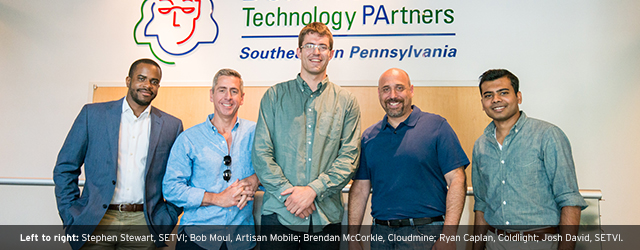On Success: Ryan Caplan, Bob Moul, Brendan McCorkle, Stephen Stewart and Josh David
It was a morning full of complicated meetings moving at a complicated pace, so we were relegated to a weird little curved room downstairs.
The “we” in question was a gathering of some interesting folks: Ryan Caplan, founder/CEO of ColdLight, just sold his Internet of Things predictive data firm for $105 million; Bob Moul, CEO of Artisan Mobile and of Boomi fame; Brendan McCorkle, CEO/Founder of CloudMine; and Josh David and Stephen Stewart, CEO and COO of SETVI.
The tone of the room felt less like a gathering of hard-hitting entrepreneurial trailblazers and more like family reminiscing past holidays, or veterans sharing stories of a battle. There was a tangible familiarity among them.
Conversation revealed that Ryan and Bob have something unique in common. “I was thrilled when Bob turned the [ColdLight] CEO role down,” Ryan said.
After Bob’s success with the sale of Boomi to Dell, Ryan sought his advice in managing the growth and operation of ColdLight. “Bob gave lots of tough love, which we needed, but maybe weren’t always ready to take.” Planning for ColdLight’s future, Ryan was considering some careful additions to the company’s executive leadership. Bob considered the CEO role for ColdLight, but ultimately told Ryan that he was taking a different path.
“You sounded relieved,” said Bob. He was. It was the moment that Ryan realized he wanted to lead ColdLight to success, but that he really needed advice to get there. But he wondered, “Can I still be CEO of a company, and not know all of the answers?”
“One of the most important characteristics of successful entrepreneurs is being self-aware, and willing to ask for help,” Bob said. “To admit that we don’t have all the answers is a really hard thing to do. Ryan’s humility is a big chunk of why he’s been as successful as he’s been.”
Brendan McCorkle identified with that. “I was definitely bad at taking advice at the beginning. It’s been an interesting evolution for me. It’s part of what you have to go through.”
CloudMine, the cloud-based mobile app and content platform and Project Liberty graduate, raised an additional $5 million in new funding in March. “There’s a point of non-humility that gets you in, but then you start running into walls. You have to be that way in the beginning, but it doesn’t set you up for success. You have to be savvy enough to realize that.”
Brendan had turned to Bob for some advice too. “Not every decision can be a group decision,” recalled Brendan. His conversations with Bob led him to realize the value of advice, but also to structure his own organization to respond better to the right advice. “It took me about a year to fully internalize that. It changed our internal conversation to a more professional one. ”
With mobile sales enablement platform company SETVI coming into its two-year anniversary, COO Stephen Stewart was reminded of a formative realization, too. “More than just being humble in looking for advice, you have to figure out who are the right people to take advice from,” Stephen noted. “As much as you might have to vet out a potential employee, you have to vet out your mentors.”
The group agrees, discussing the many functional knowledge gaps for which additional expertise may be critical for success: legal, finance, and operational disciplines among them. But identifying limits to advice is just as necessary. Ryan notes, “You want to be gracious with your time, and talk to people. You never know where the next deal will come from … but you might get into a professional relationship, and at some point wonder what your organization is really getting out of it. Giving yourself permission to advance to new relationships will let you evolve faster as an entrepreneur.”
Likewise, as the business starts to take flight, expect departures beyond your control. “I used to have a really hard time when people would leave the company. I thought that meant they felt that my vision [of the company] wasn’t good,” he added. “Entrepreneurs don’t often talk enough about that process of self-doubt.”
The group agreed that awareness of this sensitivity grew as additional investors came into view. “As I was trying to evaluate whether [a potential investor] was right, I was questioned on my ability to lead a company.” Brendan recalled similar moments of doubt in debriefing from meetings from their recent investments. His comments with colleagues noted, “I don’t know if you knew what just happened, but you just got interviewed, and get to keep your job.”
By Ryan’s observation, the best entrepreneurs develop “a sense of smell” for the right relationships. It happens by devoting most of their time to connecting with many individuals, seeking input while inviting them to get excited about their business, but really discerning which advice comes from experience versus advice less qualified. And at a lot of points in the process, the advice won’t be fun.
“But you have to be stubborn enough not to stop,” said Ryan. “There’s no business that doesn’t face material adversity at some point. Even though all of the odds in the world seem against you being successful, sometimes you just need encouragement that it can be done.”
An outside observer to ColdLight’s trajectory might conclude that through its purchase by the 6,000+ person, publicly traded PTC, Ryan has earned success, and some closure to the learning cycle of entrepreneurship. That would be wrong.
“Learning from such a very accessible and approachable executive team [as at PTC] is new to me. The way that a larger public company approaches scale is very interesting. Now it’s about ‘let’s make this thing really big.’ I didn’t know that at the beginning.”
It’s also about passing along the earned knowledge, too. Added Ryan, “You have to stay close to the entrepreneurs. I’m learning as much from early stage entrepreneurs as I am from the management of a publicly traded company.”
Stephen posed the question of the day to Ryan: In reflecting on this exposure to new management expertise, “Would you have done anything differently?” Through elaboration, further questions emerge: Does the startup model have to be executed separately or differently from large company thinking of scale? Are there things about that large company exposure that can inform an entrepreneur?
Ryan noted that the passion and energy of the founders is about more than the money. It’s what drives the business, and it sells the product best. For the time that he put into ColdLight’s development, Ryan adds, “My mom said ‘that’s great – you just made about $1.50 an hour.’” It’s a labor of love.
“I got to thinking about whether or not I wanted to start a company or this company,” said Ryan. “I realized I was focused on getting the first or next customer, not on getting a thousand. If I was to do it again, I would have had scale in mind.” But Bob had been thinking about this, too.
“There’s danger of crushing the little thing that you’re trying to nurture, like dumping a bag of fertilizer on a seedling,” Bob noted. Over-organization of a business before proving its viability—by having those many conversations with potential customers and advisors—is just as common a problem for entrepreneurs.
This hit a note with Josh David, SETVI’s CEO. “You have to do everything at the start. You’re thinking about every single thing, and trying to create value out of it.” Josh discussed his own conversations with Bob, and the advice he gave the SETVI team; that getting help is important—but too much concern for growth, before the full value and benefit of the product or service has been fully formed, can cause issues. “We tried getting someone else to do the selling for us. But Bob told me ‘You should be doing this!’” Ryan agreed. “I wanted someone to take the early punches for me in sales or raising money—but you have to be willing to get punched in the face. You have to get past the insecurity of failing.”
It became clear that if left unchecked, this conversation could go on for a very long time. But the group concluded with unanimous agreement that the most important factor in their success was devoting the time to do what they just did.
Said Ryan, “The relationships I developed along the journey were the most valuable component.”





